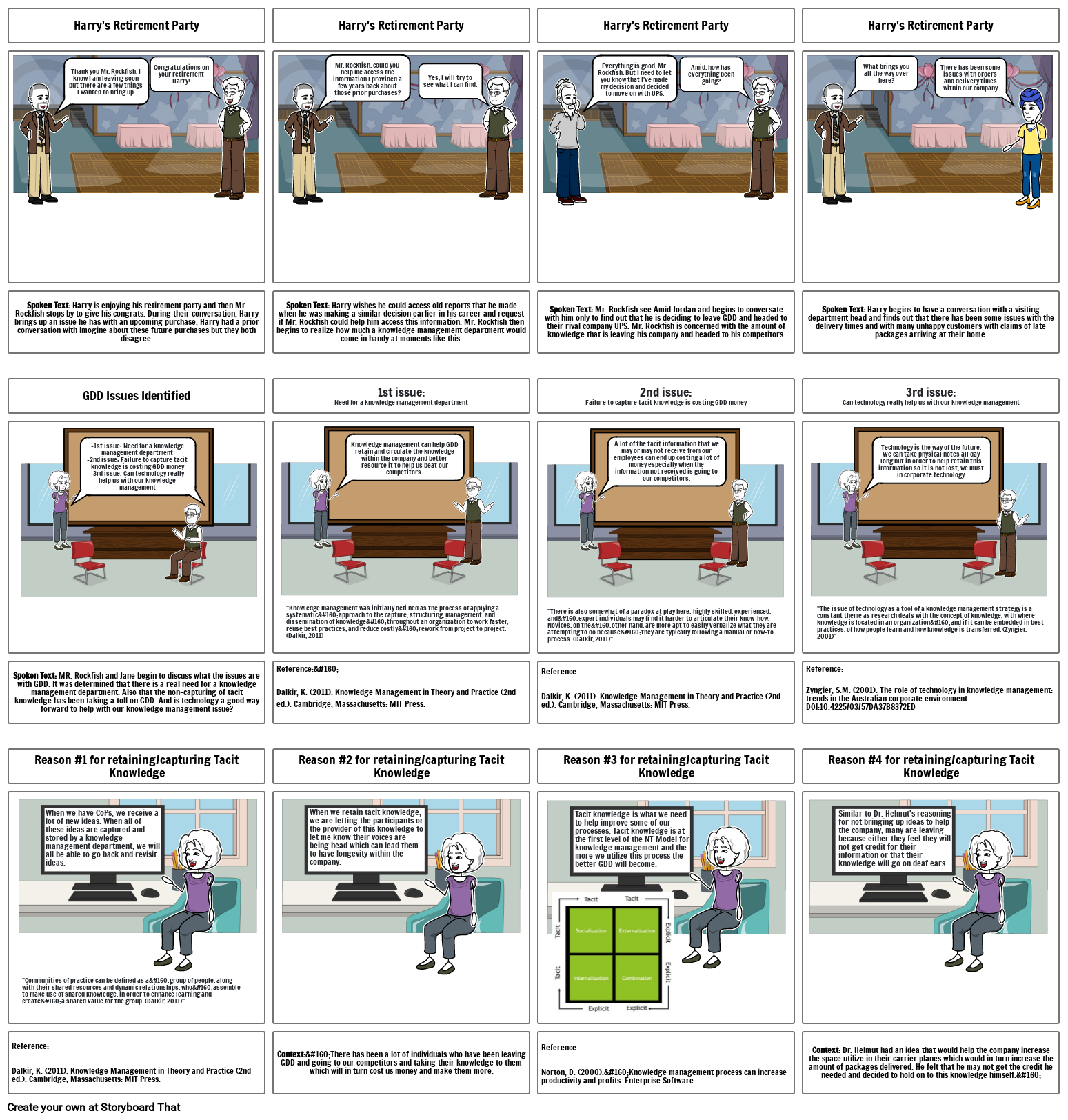20230210-BMGT_305-Week_05-Storyboard-initial-Bun_Gnoy

Storyboard Tekst
- Harry's Retirement Party
- Thank you Mr. Rockfish. I know I am leaving soon but there are a few things I wanted to bring up.
- Congratulations on your retirement Harry!
- Harry's Retirement Party
- Mr. Rockfish, could you help me access the information I provided a few years back about those prior purchases?
- Yes, I will try to see what I can find.
- Harry's Retirement Party
- Everything is good, Mr. Rockfish. But I need to let you know that I've made my decision and decided to move on with UPS.
- Amid, how has everything been going?
- Harry's Retirement Party
- What brings you all the way over here?
- There has been some issues with orders and delivery times within our company
- Spoken Text: Harry is enjoying his retirement party and then Mr. Rockfish stops by to give his congrats. During their conversation, Harry brings up an issue he has with an upcoming purchase. Harry had a prior conversation with Imogine about these future purchases but they both disagree.
- GDD Issues Identified
- -1st issue: Need for a knowledge management department-2nd issue: Failure to capture tacit knowledge is costing GDD money-3rd issue: Can technology really help us with our knowledge management
- Spoken Text: Harry wishes he could access old reports that he made when he was making a similar decision earlier in his career and request if Mr. Rockfish could help him access this information. Mr. Rockfish then begins to realize how much a knowledge management department would come in handy at moments like this.
- 1st issue: Need for a knowledge management department
- Knowledge management can help GDD retain and circulate the knowledge within the company and better resource it to help us beat our competitors.
- Spoken Text: Mr. Rockfish see Amid Jordan and begins to conversate with him only to find out that he is deciding to leave GDD and headed to their rival company UPS. Mr. Rockfish is concerned with the amount of knowledge that is leaving his company and headed to his competitors.
- 2nd issue: Failure to capture tacit knowledge is costing GDD money
- A lot of the tacit information that we may or may not receive from our employees can end up costing a lot of money especially when the information not received is going to our competitors.
- Spoken Text: Harry begins to have a conversation with a visiting department head and finds out that there has been some issues with the delivery times and with many unhappy customers with claims of late packages arriving at their home.
- 3rd issue: Can technology really help us with our knowledge management
- Technology is the way of the future. We can take physical notes all day long but in order to help retain this information so it is not lost, we must in corporate technology.
- Spoken Text: MR. Rockfish and Jane begin to discuss what the issues are with GDD. It was determined that there is a real need for a knowledge management department. Also that the non-capturing of tacit knowledge has been taking a toll on GDD. And is technology a good way forward to help with our knowledge management issue?
- Reference:Dalkir, K. (2011). Knowledge Management in Theory and Practice (2nd ed.). Cambridge, Massachusetts: MIT Press.
- Knowledge management was initially defi ned as the process of applying a systematicapproach to the capture, structuring, management, and dissemination of knowledgethroughout an organization to work faster, reuse best practices, and reduce costlyrework from project to project. (Dalkir, 2011)
- Reference: Dalkir, K. (2011). Knowledge Management in Theory and Practice (2nd ed.). Cambridge, Massachusetts: MIT Press.
- There is also somewhat of a paradox at play here: highly skilled, experienced, andexpert individuals may fi nd it harder to articulate their know-how. Novices, on theother hand, are more apt to easily verbalize what they are attempting to do becausethey are typically following a manual or how-to process. (Dalkir, 2011)
- Reference:Zyngier, S.M. (2001). The role of technology in knowledge management: trends in the Australian corporate environment. DOI:10.4225/03/57DA37B8372ED
- The issue of technology as a tool of a knowledge management strategy is a constant theme as research deals with the concept of knowledge, with where knowledge is located in an organizationand if it can be embedded in best practices, of how people learn and how knowledge is transferred. (Zyngier, 2001)
- Reason #1 for retaining/capturing Tacit Knowledge
- When we have CoPs, we receive a lot of new ideas. When all of these ideas are captured and stored by a knowledge management department, we will all be able to go back and revisit ideas.
- Reason #2 for retaining/capturing Tacit Knowledge
- When we retain tacit knowledge, we are letting the participants or the provider of this knowledge to let me know their voices are being head which can lead them to have longevity within the company.
- Reason #3 for retaining/capturing Tacit Knowledge
- When we retain tacit knowledge, we are letting the participants or the provider of this knowledge to let me know their voices are being head which can lead them to have longevity within the company.
- Reason #4 for retaining/capturing Tacit Knowledge
- Reference: Dalkir, K. (2011). Knowledge Management in Theory and Practice (2nd ed.). Cambridge, Massachusetts: MIT Press.
- Communities of practice can be defined as agroup of people, along with their shared resources and dynamic relationships, whoassemble to make use of shared knowledge, in order to enhance learning and createa shared value for the group. (Dalkir, 2011)
- Context:There has been a lot of individuals who have been leaving GDD and going to our competitors and taking their knowledge to them which will in turn cost us money and make them more.
Izrađeno više od 30 milijuna scenarija

